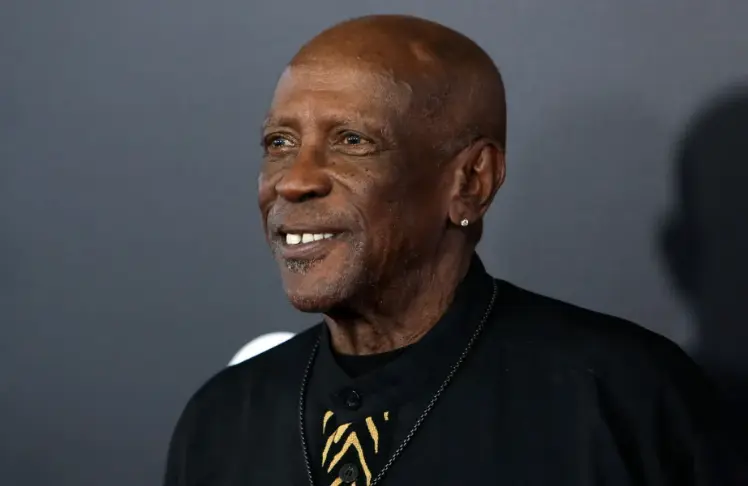
Louis Gossett Jr., the first Black man to win an Oscar for best supporting actor and who won an Emmy for his performance in the groundbreaking TV drama “Roots,” died early Friday. He was 87.
Gossett’s family announced his death, according to The New York Times. No cause was given.
A Lifetime of Achievement
A native of New York City, Gossett’s professional career spanned a remarkable seven decades, stretching back to his Broadway debut as a teenager in the early 1950s. He continued acting and directing into his 80s, including pivotal roles in the hit 2019 HBO science fiction series “Watchmen,” and the 2023 remake of “The Color Purple.”
Though his acting career was grounded in the theater, Gossett was best known for taking on a wide variety of roles in film and on TV. Over the course of his career, Gossett has played a guileless college student, a streetwise hustler, a lawyer, a bar owner, and a wise Plantation slave. He recently portrayed Billy Flynn, the suave, manipulative attorney in the Broadway revival of “Chicago.”
But Gossett is arguably best known for two award-winning, breakthrough roles: Fiddler, the mentor to young slave Kunta Kinte in the groundbreaking 1977 TV drama “Roots,” and Sgt. Emil Foley, the hellish drill instructor-turned-father figure to Richard Gere’s struggling flight-school recruit in “An Officer and a Gentleman” in 1982.
Though his TV and movie career was somewhat defined by portraying authority figures often guiding much younger characters, Gossett took pride in his hard-earned acting range. But he also was realistic about the systemic racism in Hollywood, evident in the roles he was offered during his career.
“I can do more than anyone suspects,” Gosset once said in an interview. “I pride myself on my versatility. It took 32 years of difficult parts, second leads, villains, and juveniles. The Oscar changed the quality of the roles I was being offered.”
Early Life and Inspiration
Born on May 27, 1936, in Brooklyn, Gossett was the only child of Louis Gossett, a railroad porter, and his wife Helen, a nurse. Tall and rangy, the younger Gossett excelled in sports and seemed to have a future as a pro athlete. But a basketball injury in high school changed the trajectory of his life.
To keep himself occupied while recovering, Gossett took up acting. His performance impressed the drama teacher, who encouraged him to audition for a Broadway play even though he was just 17 with no previous experience. He won the role.
Portraying a troubled adolescent in “Take a Giant Step,” Gossett won accolades in his stage debut, and acting began to compete with athletics. He continued to act while attending New York University on a basketball scholarship, majoring in drama with a minor in pharmacy — his first career choice.
“I always wanted to study pharmacy,” Gossett said at the time in an interview with The Sunday Mirror. “But now after college I’ll try acting. I know it’s a tough business, but if I fail, I’ll have the pharmacy degree to fall back on.”
Although he’d established himself as a promising young theater talent, a pro basketball career was still on the table. Gossett told People magazine in an interview earlier this year that he’d been invited to join the New York Knicks, one of the best teams of that era, when he got his first big acting break.
“I was at rookie training for the Knicks when I got a call from Lorraine Hansberry to be a part of ‘A Raisin in the Sun’” with Sidney Poitier, Gossett said. “They said the part comes with a $700 per diem, more money than most professional athletes had in the bank at the time.”
That made it an easy call: “I put the basketball down, and the rest is history,” he said.
An Unmatched Legacy
After building a successful Broadway career, Gossett headed to Hollywood and the big and small screens. He established himself with roles in dozens of films, ranging from character studies like “The Landlord” in 1970 to the 1977 science fiction thriller “The Deep.”
He also appeared in more than 100 TV shows, according to The New York Times, including 70s sitcoms like “The Partridge Family” and present-era dramas like “Madam Secretary.” A director as well as an actor, Gossett also had his own short-lived TV series in 1988, “Gideon Oliver,” portraying a crime-solving Columbia University anthropology professor.
Winning an Emmy for “Roots” and an Oscar for “An Officer And A Gentleman” elevated Gossett’s stature and established him as a member of the Black Hollywood pantheon. But like other Black actors who won Oscars, it didn’t immediately change his bank account or workload.
“I was left with a lot of time on my hands,” he said. “I thought I’d get a lot of offers — and they didn’t come…Never made a million dollars from any of my 78 movies. People thought I had this fortune, which I never had.”
The following year, though, Gossett starred as slain Egyptian President Anwar al-Sadat in “Sadat,” for which he received his fifth Emmy nomination. Selected by Sadat’s widow herself, has called it one of his most interesting roles.
Off-Screen Impact
Gossett used his celebrity to fight for civil rights and founded Eracism, a nonprofit institute that trains young people and adults how to fight racism in society as well as within themselves. And although one of his signature roles was that of a slave, Gossett says it gave him a different perspective on what his ancestors must have endured, and a new appreciation of their ability to survive.
“The two lines from ‘Roots’ that stick out to me are, ‘You no more in Africa. You in America now,’ and what I said after Kunta escaped: ‘What is it like to be free, Kunta? It must be something,” Gossett said.
He is survived by two sons, Satie Gossett and Sharron Gossett.















